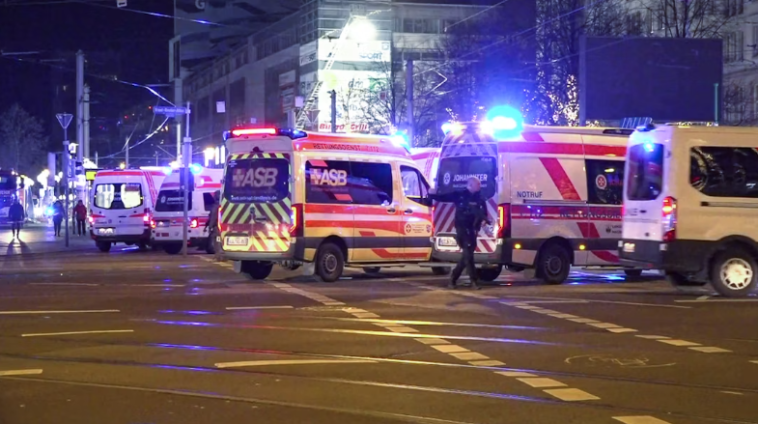German law enforcement officials reportedly ignored repeated warnings from Saudi Arabia about the potential danger posed by Taleb al-Abdulmohsen, the man accused of driving into more than 200 people at a Christmas market in Magdeburg on Friday night. Saudi authorities had alerted Germany three times about al-Abdulmohsen, describing him as a security threat due to extremist views he posted online. These warnings, dating back to 2007, included requests for his extradition, which Germany did not act upon.
The Attack and its Aftermath
The incident occurred at a crowded Christmas market in Magdeburg, where al-Abdulmohsen allegedly drove his vehicle into a packed street, killing at least five people and leaving over 40 others with life-threatening injuries. Witnesses described the chaos as people attempted to escape the vehicle’s path.
The Magdeburg Public Prosecutor’s Office suggested that the 50-year-old suspect may have been motivated by dissatisfaction with how Saudi refugees are treated in Germany. This assertion has raised further questions about his intentions and the German government’s failure to address the earlier warnings.
Saudi Arabia’s Warnings
Saudi authorities first flagged al-Abdulmohsen in 2007, just a year after he entered Germany, citing his extremist online behavior and labeling him a security risk. In 2007 and 2008, Saudi Arabia formally requested his extradition, but these requests were denied. Despite continued monitoring of his activities, no significant action was taken to mitigate the potential threat he posed.
Online Behavior and Ideological Questions
Al-Abdulmohsen’s online activity included posts expressing aggressive anti-Islam sentiments and support for Germany’s anti-immigration AfD party. However, some have questioned the sincerity of these statements, suggesting they may have been a ploy to mislead authorities or the public.
Iranian dissidents and other commentators have raised concerns that al-Abdulmohsen could actually be an Islamic extremist who used false narratives online to mask his true beliefs. Investigations are ongoing to determine whether his social media posts were genuine or part of a deceptive strategy.
Public and Political Reactions
In the aftermath of the attack, right-wing demonstrators gathered in Magdeburg, expressing anger over the incident and criticizing the government’s handling of immigration and public safety. Slogans shouted during the protests included “Migration kills,” “Deport, deport, deport,” and “We must take back our cities, our villages, and our homeland.”
Police intervened to disperse the protest, which was labeled as a right-wing extremist demonstration by German media outlets. Critics have argued that the public’s frustration stems from broader concerns about security lapses and the government’s immigration policies.
Broader Implications
This tragic incident has reignited debates in Germany about immigration, public safety, and the government’s ability to respond to security threats. Critics of Germany’s left-leaning government have pointed to this case as evidence of systemic failures in addressing warnings about dangerous individuals.
The attack also highlights the complexities of monitoring individuals who espouse extremist views online, particularly when those views may be intentionally misleading. As Germany grapples with the aftermath, the focus will likely shift to addressing the failures that allowed this tragedy to occur and ensuring similar warnings are not ignored in the future.


